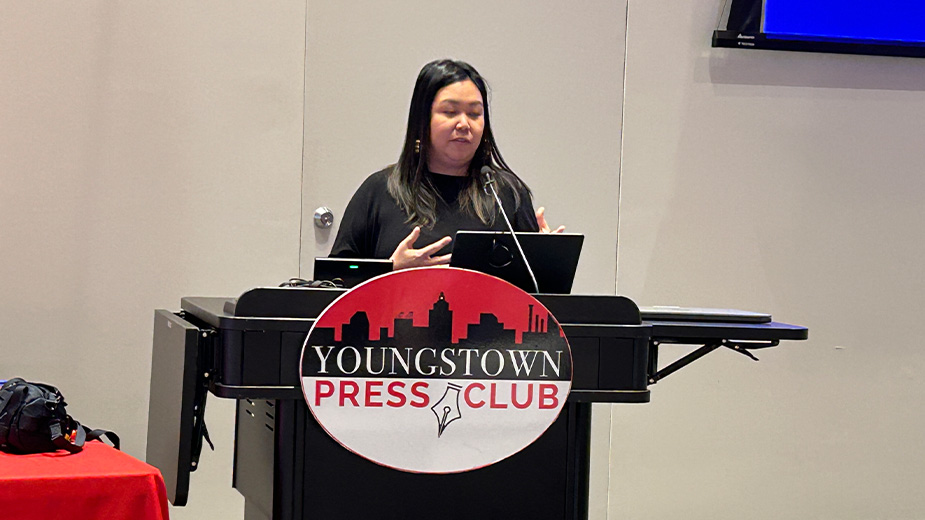Riviera to Harvest Marijuana Crop Early in 2019
YOUNGSTOWN, Ohio – What might be the most technologically sophisticated medical marijuana operation in the world is growing in our own backyard.
So says Brian Kessler, chairman of Riviera Creek LLC, which has converted a 75,000-square-foot industrial building along Crescent Street in Youngstown into an ultra-modern cultivation and research building dedicated to the production of medical cannabis.
“We’ve built a facility that’s never been built before,” Kessler says as he walks down a long, brightly lit corridor flanked on both sides with secure entrances to grow rooms, laboratories and testing operations. “We’ve brought the most sophisticated technology probably in the world – definitely the country – to Youngstown. No one has ever done this.”
Riviera Creek is among 13 companies that succeeded in obtaining a Level I license to cultivate medical marijuana, made legal under Ohio House Bill 523, which allows for the cultivation, processing and dispensing of medical marijuana to patients across the state. In September, the state awarded Riviera a certificate of operation, and it began to grow its product at its building.
That crop should be ready for harvest by early next year, Kessler says. “We have a test product underway right now and we should be ready to ship by the end of January,” he says. Precisely how much Riviera Creek will produce next year depends on several variables, most important of which is patient demand.
The patient registry of the state should be activated soon, Kessler says. “Once the patient count is turned on, that will drive it,” he says.
The Ohio medical marijuana program is still in its early stages and fewer than a dozen out of 26 Level I and Level II cultivation sites across the state are certified for operation, Kessler says. Level I licenses allow up to 75,000 square feet of cultivation space, while Level II licenses are approved up to 3,500 square feet.
Some dispensaries across the state are preparing to open their doors as early as this month, and Kessler wants to be sure that his operation is manufacturing a product that can be placed on shelves in time. Quest Wellness, a medical marijuana dispensary slated to operate in Youngstown on Market Street, is hoping to start its business by January.
While the Ohio medical marijuana program is in its infancy, Kessler is no stranger to the industry. Over the last five years, he’s studied other operations across the country and formed a best-practices approach gleaned from his experiences in the industry.
“I’ve taken the experience we’ve had in other facilities around the country, combined it with my relationships with manufacturers, and have developed an automated environment that is designed to grow hopefully the most consistent and safe product available on the market,” he says.
Consistency is key to the entire operation, Kessler emphasizes. The growing environment used in most medical marijuana cultivation centers across the country often varies, making it hard for these growers to deliver the same product every time, Kessler says. The goal of Riviera Creek is to remove that uncertainty and ensure that patients know that the company’s product is safe.
Getting to this point required plenty of work and research, Kessler says. Moreover, the new plant is inundated with layers of security systems able to monitor a person’s every move inside.
Barbed-wire fencing and a security gate greets visitors as they approach the outside lot, all of which is covered by security cameras that beam images on large computer screens inside the building. The gate will not open without a proper code or clearance.
Joe Bernan, chief operating officer of Riviera Creek, says all of the security cameras and data the operation generates are tied into the state system, so those monitoring the medical marijuana program have access. “They have a direct feed to the state and they have direct access to every camera shot.”
A code is also required to enter a small holding area that leads to the offices, where the identifications of every visitor who enters the building are recorded with a photograph printed on a badge worn at all times.
“You can’t do anything here without 10 other people knowing about it,” Kessler says. “Even your ID tag tells the state that you are in this building. There’s tier after tier of security in this facility.”
Once in, anyone handling the marijuana plants must exchange his street clothes for suits akin to surgical scrubs and accessories such as hair covers, gloves and masks. Shoes and socks are also removed and plastic Croc-like slip-ons are worn by employees and visitors throughout.
Kessler gestures down a long, brightly lit hallway that is gleaming white. On one side are doors that lead to offices and laboratories. Across the hall are four grow rooms where the plant cultivation takes place.
Inside one of the labs, a technician peers into a computer screen, monitoring all of the growing conditions throughout the operation.
Technicians walk the floor with hand-held electronic tablets, which are able to provide real-time data related to humidity, temperature, carbon dioxide levels and other aspects of the indoor growing environment.
Four rooms – most of them lined with LED lighting – are dedicated to growing cannabis. The process includes an aeroponic method in which the plants are fed with only nutrients and water. No soil is used during the cultivation process.
Once the plants are harvested, they move through a drying process and an automated system removes the buds from the plant. The product is stored in a vault, and shipped out when ready using the company’s delivery trucks.
The cannabis will then be processed into tinctures, edibles, flour or oils that are distributed to dispensaries for medical use.
As of now, Riviera Creek has applied for, but not received, a processor’s license. Kessler says the company should know soon whether it will be awarded a processor’s license in addition to a cultivation site. Should the company fail to secure a processor certification, then it is prepared to work with others that have, he says.
In addition to security, the entire cultivation process is monitored 24/7, says Dan Kessler, president and CEO of Riviera Creek, and Brian’s nephew.
“We can get data 365 days a year on every plant we have growing. We’re monitoring 70 different functions in the process,” he says. “This type of equipment changes the entire industry.”
Microscopes and other lab equipment inspect for defects in plants such as mold, mildew or heavy metals to ensure that the product is clean.
Given the sophisticated technology, Riviera Creek is looking for employees who have some skill or familiarity with the industry – a difficult order since medical marijuana is so new to Ohio, the younger Kessler says. The solution is to train local residents in a profession that heretofore didn’t exist in the Mahoning Valley. “We want to keep our staff local,” he says.
Riviera Creek employs about a dozen right now, but that number could grow to more than 100 should patient demand and production ramp up as expected over the next several years.
“They’re getting industry training at places such as the Cleveland School of Cannabis,” Dan Kessler says. “We’re also doing training on our systems because they’re so unique.”
The Cleveland School of Cannabis, based in Independence, opened in January 2017 in anticipation of growing demand across the medical marijuana industry, says Kevin Greene, vice president of admissions and recruiting.
“There’s really no one else developing the workforce for cannabis here,” he says.
Students can earn certification through three tracks – cultivation, dispensary operations and medical applications related to processing, Greene says.
About 130 students are enrolled in the programs, he adds.
“This industry requires a very technical understanding,” he says. “You have to remember that you’re growing medicine.”
The school plans to open a site in Columbus early next year, and he expects the market in Ohio to expand significantly. The industry, for example, is doing well in Colorado, which has a population of about 5.3 million people. Ohio has 13 million, he says. Plus, the medical cannabis industry is on track to cresting at $1.3 billion by 2025.
Indeed, interest in cannabis has won the attention of major investors and those who see real business value in the marketplace, Brian Kessler says. “We were recently in Nevada at the National Cannabis Convention,” he says. “There were about 50,000 people there – most of them in suits and ties.”
Six years ago, just 500 attended, most of them dressed in tie-dyed shirts and casual attire. “Today, it’s all corporate. It’s stunning how far this industry has come and the direction it’s headed,” he says.
For Riviera Creek, the impact of the industry can be felt well beyond its operation on Crescent Street, the Kesslers say. Positions in construction as the company expands, transportation, research and development, fledgling biotechnology jobs – all are potential offspring from what the company is attempting to do in Youngstown.
“I’m hoping that opening one of the major grows in Youngstown will attract others in areas such as research and development,” Brian Kessler says. “We’ve brought one of the most sophisticated, technologically driven facilities here and we want to attract others to work with us.”
VIDEO: Watch today’s ‘3 Minutes With’ Brian Kessler
Pictured: Daniel Kessler, president and CEO of Riviera Creek LLC and his uncle, Brian Kessler, chairman of the company’s board.
Copyright 2024 The Business Journal, Youngstown, Ohio.


